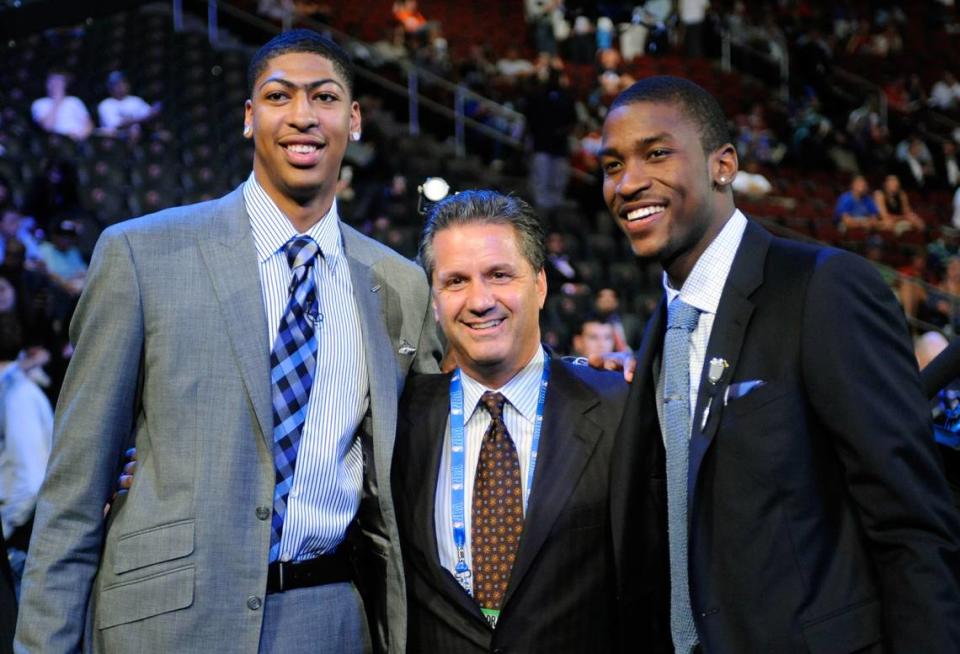Michael Kidd-Gilchrist: You know me from UK basketball, not as someone who stutters. | Opinion
- Oops!Something went wrong.Please try again later.
My life story, success, and goals are all tied to the state of Kentucky and its people. Inside the Commonwealth are those who share a bond with me, whether through sports or as a person who stutters.
Though most people may recognize me and even remember my stats during my time as a University of Kentucky basketball player, many would not know my struggles as someone who stutters. There is a staggering lack of data regarding the general public’s awareness of those who stutter. We live in a time when people are conditioned to fear the unknown rather than search for answers or solutions to problems. For people who stutter, that fear can encapsulate us in everyday actions, leading us to feel there could never be solutions to our problems, questions, or concerns.
Over the past two years, I have personally been keeping my feet on the ground in the great Commonwealth of Kentucky. From Paducah to Northern Kentucky, I have been taking time to hear testimonies from people who stutter and advocating at hospitals, universities, and school systems. I am pushing myself to use the very thing that can be a struggle—my voice—to speak up for the community I represent and whose voices often go unheard.
A primary obstacle to treatment for those who stutter is the way that insurance coverage is structured for this condition. Are you aware that most commercial insurance carriers cover speech therapy? However, it is difficult to obtain that treatment because insurance carriers typically exclude the necessary services to diagnose the condition so that treatment can be administered. For example, when a customer calls their chosen insurance provider for information on coverage of speech therapy for stuttering, it is more than likely they will be told that the diagnostic procedures are not covered. As a result, the insured person interprets this to mean it isn’t covered at all—and, for all intents and purposes—it isn’t if a diagnosis can’t be obtained. This leads to high out of pocket costs when insurance denies diagnostic procedures/intervention or speech therapy altogether.
So how does one receive the help they need if not through the providers who can move those services forward? For treatment to be more widely administered, it is necessary for the diagnostic procedures to be added to the list of items covered by insurance. For children and adults who stutter to be set up for success in life and overall quality of life improvements, it is necessary that they be given access to all necessary procedures — from diagnosis to treatment to long-term speech therapy maintenance.
Fortunately, for those who stutter, the gap in coverage can been filled by public school systems, universities, private clinics, and hospitals. These are all typical settings where a person can receive speech therapy, but each of these institutions face their own challenges.
Public school speech-language pathologists (SLPs) are not only burdened with extremely high caseloads, but often have fewer available speech therapy sessions. Unfortunately, many SLPs do not specialize in stuttering and therefore are not necessarily well equipped to provide effective speech therapy for stuttering. Many people are aware of the learning gap that can occur when school is out for summer break, but this also creates another critical gap with speech therapy sessions for students who rely on school SLPs.
The Covid-19 pandemic and the shift to remote learning presented both opportunities and challenges for people needing stuttering therapy from SLPs. Virtual sessions allowed for continued access to therapy but also limited valuable in-person interaction and hands-on therapy.
Universities, private clinics, and hospitals each grapple with distinct challenges in providing access to SLPs, such as financial constraints and limited resources. High demand for services coupled with long waitlists can result in scheduling difficulties for parents, those who work multiple jobs, and students with conflicting class schedules. Transportation issues can also increase the difficulties faced by those seeking treatment, as these locations may require significant travel, adding time and financial burdens to an already demanding situation. Additionally, people who stutter may find it challenging to articulate their needs with public transportation providers, which can lead to heightened stress and frustration.
Speech-language pathology is an important field that helps patients from infants to seniors. Dedicated SLPs provide broad and comprehensive support for a wide range of speech disorders, but the lack of dedicated training and education in stuttering within the field of speech pathology highlights the need for it to be recognized as a specific area of practice. Specialized training for SLPs is crucial to effectively address the unique challenges associated with stuttering therapy. This would lead to more early intervention opportunities, allowing SLPs to teach effective communicative skills that boost confidence and comfort for those who stutter.
Several years ago, I formed the nonprofit organization Change & Impact to change the social stigma of stuttering through advocacy, education, and awareness. We are committed to improving access to healthcare and expanding services and resources for those who stutter. I will always be grateful for the way the people of Kentucky supported me throughout my basketball career, and I’m proud to be an ambassador for the stuttering community in the Commonwealth and across the country.

Michael Kidd-Gilchrist played for the University of Kentucky men’s basketball team from 2011 to 2012 and went on to the Charlotte Hornets. He is the founder of a non-profit to help people who stutter.

